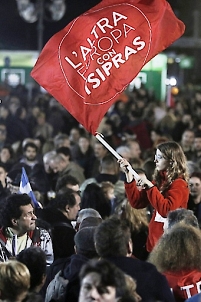Erstellt am: 30. 1. 2015 - 15:21 Uhr
When elections become part of the problem
Greece is eagerly awaiting the changes set out by the new government, and the euphoria of Syriza's victory is still bubbling in the air.

EPA/YANNIS KOLESIDIS
However, as the fizz starts to fade, people are starting to ask whether the government can deliver on its promises. The answer is "almost certainly", and we're more likely to see some repackaging of the problems rather than any real solutions.
The reason? Quite simply, the problems Greece is facing are not issues that can be resolved with a "quick fix", nor are they essentially political in nature. They are more about the structure of the economy and the society, about developing a sound and sustainable base, and embracing modern technologies and techniques. None of these are going to happen by changing the government, nor will they happen overnight.
Greece may be the cradle of democracy, but right now, the repeated changes of government are the baby throwing the toys out of the pram.
Elections are a crucial element of the democratic system, but too many of them become a heavy financial burden and counter-productive to progress. The constitutional government term in Greece is four years, but recently governments are averaging two and a half years. That means almost twice the spend on elections - at a time when the country desperately needs to save public money and use the resources it has on the people's needs, not on swaying their votes.
Emanual Sigalas explains why he things the elections will make little difference to the Greece's problems, and why the rest of the world should take heed. Elections have their place, but they are not a panacea - and like most medicines, if taken in excess, they can be a poison.
Dieses Element ist nicht mehr verfügbar
Akademikerball protests
Florian Klenk of Falter discusses the issues surrounding tonight's Akademikerball and the protests against it.
Dieses Element ist nicht mehr verfügbar
Sinai attack
A group pledging allegiance to Islamic State is claiming responsibility for series of attacks in the northern Egyptian region of Sinai. Karim el Gawhary reports from Cairo on what is known about the group and their aims.
Dieses Element ist nicht mehr verfügbar

AAP/TARONGA CONSERVATION SOCIETY
Koalas under threat
Koalas numbers in Australia are falling dramatically, and a new sanctuary project plans to help save them. Dr Oisín Sweeney, of the National Parks association of New South Wales describes the risks koalas face.
Dieses Element ist nicht mehr verfügbar
The Ig-Nobel prizes
The science awards that make you laugh, and then think. The founder, Marc Abrahams, explains why the awards are important, and the inspiration behind them.
Dieses Element ist nicht mehr verfügbar
FM4 Reality Check
Monday to Friday from 12.00 to 14.00, and after the show via Podcast or fm4.orf.at/realitycheck.


